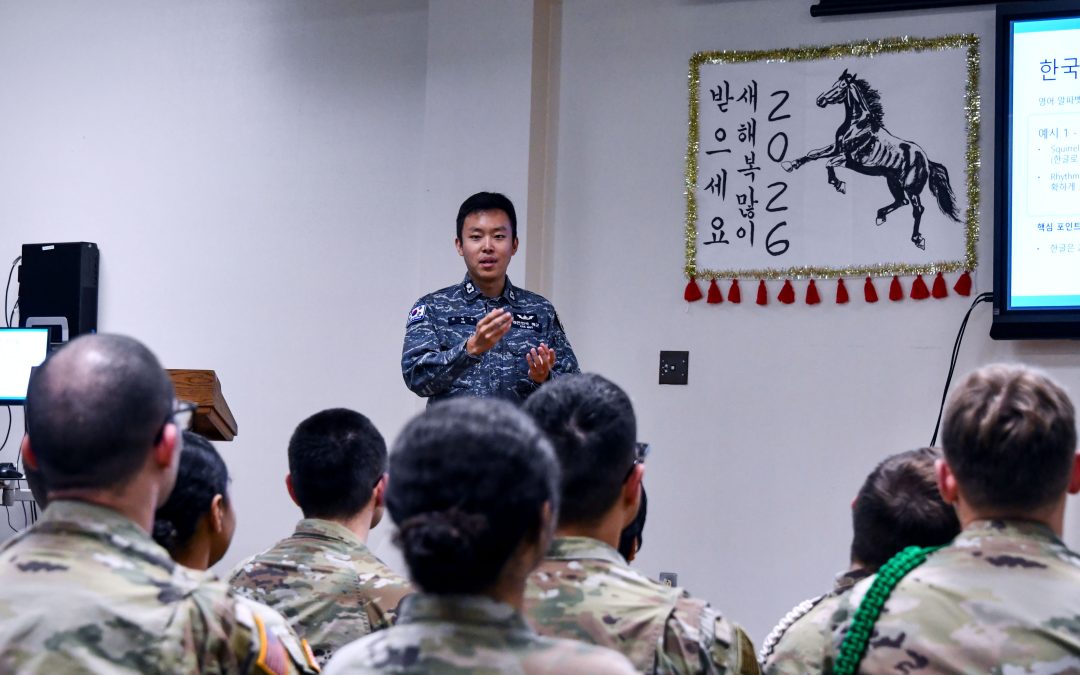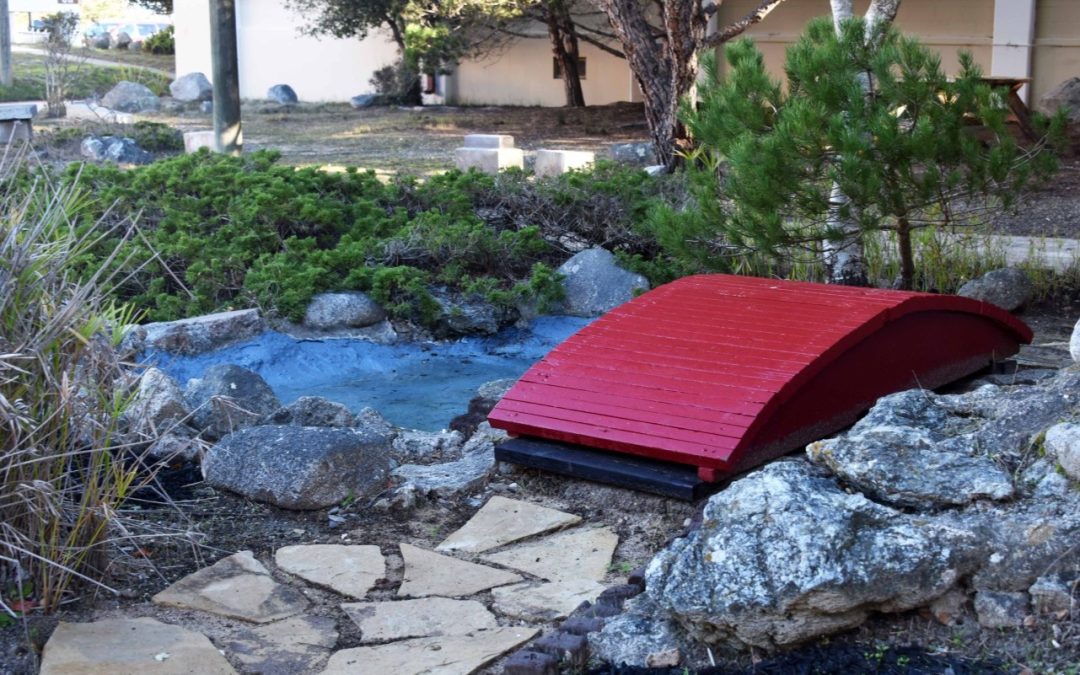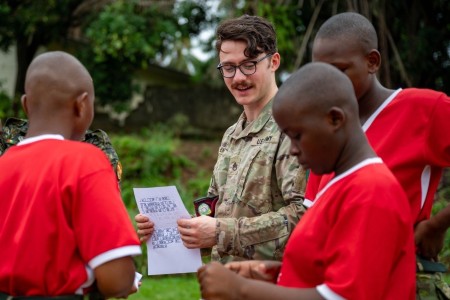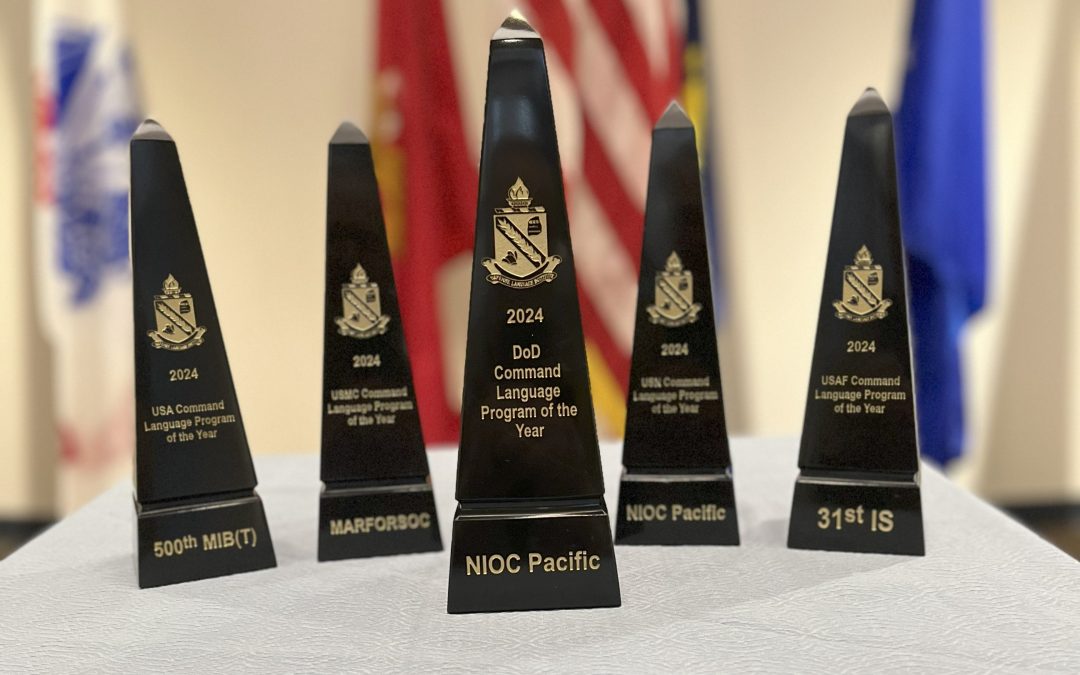By Patrick Bray
DLIFLC Public Affairs
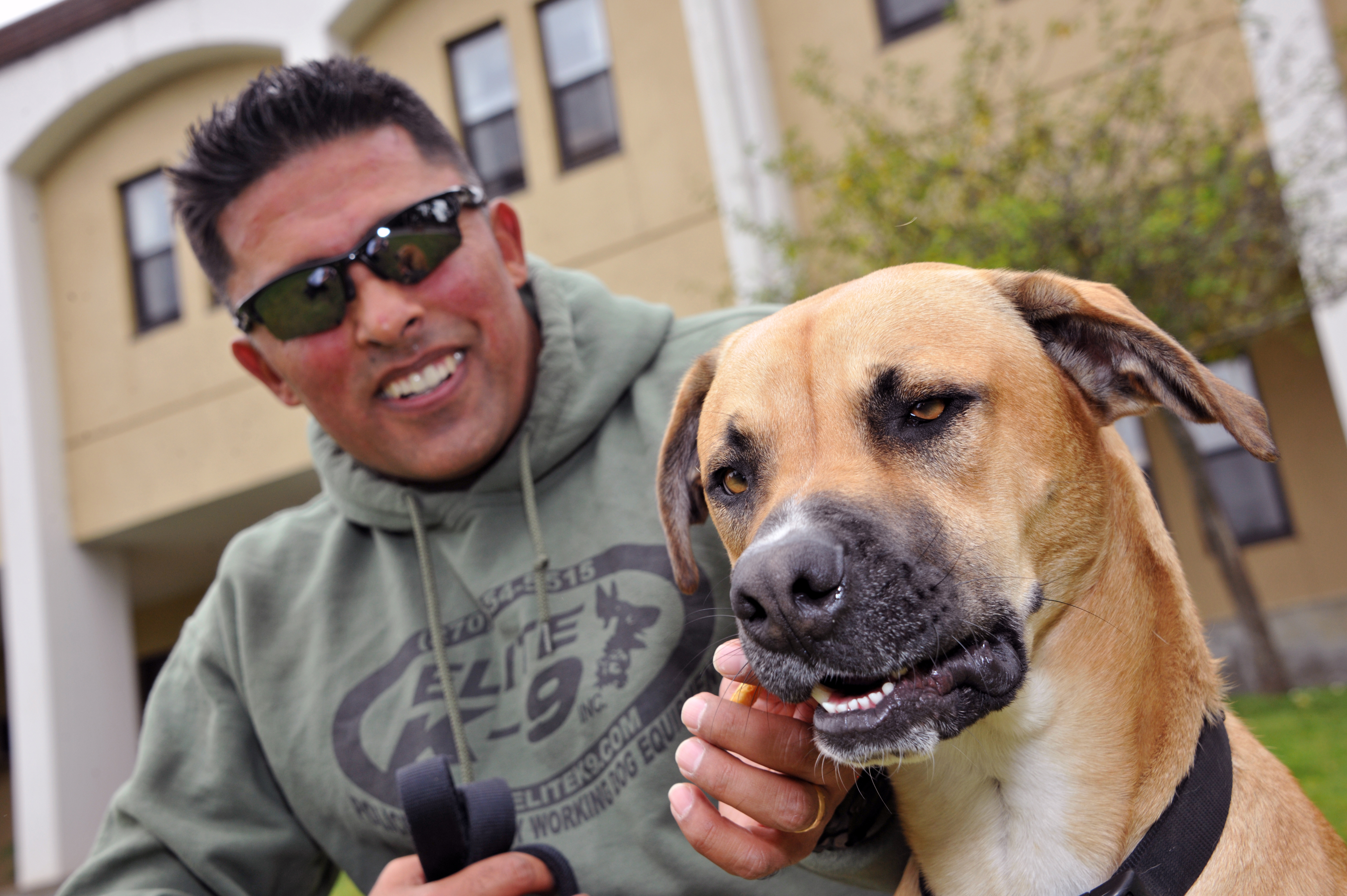
Staff Sgt. Mashal Shekib, a Military Language Instructor at the Defense Language Institute Foreign Language Center, Presidio of Monterey, California, gives a treat to the Institute’s mascot, Pfc. Lingo, Oct. 31, 2017. When he’s not teaching Pashto, from Afghanistan, Shekib likes to train dogs and operates his own canine training academy. Originally from Kabul, he immigrated to the U.S. in 2008 and enlisted in the U.S. Army in 2009. (U.S. Army photo by Patrick Bray/Released)
MONTEREY, Calif. – Every Tuesday at the Defense Language Institute Foreign Language Center, Col. Phil Deppert, commandant of the Institute, and Command Sgt. Maj. Ryan Ramsey, the senior enlisted leader, meet-and-greet all the new personnel during the newcomers briefing.
Most are fresh recruits straight out of basic training who are about to begin their language classes, while others are returning to serve as Military Language Instructors, or MLIs, within the language schools.
During the briefing, Deppert has the new MLIs stand up, say their name and where they are coming from. One Soldier stood and said, “I’m Staff Sgt. Shekib. I’m coming from Fort Gordon.”
Before moving on, Deppert said, almost without hesitation, “Wait. Stand up again. You’re a native speaker.”
Deppert had guessed correctly. Staff Sgt. Mashal Shekib is from Kabul, Afghanistan, and a native speaker of Pashto and Dari. He just recently completed the MLI certification course in September 2017 and now shares his language and culture with his students, who look to him for inspiration as a subject matter expert.
MLIs are qualified noncommissioned officers who teach students in their language and serve as an example to them. They bridge the gap between the military units and the civilian staff in all eight schools and languages taught at DLIFLC.
Watching students study (and struggle) with Pashto reminds Shekib of his own experience, only the other way around, he said about his English studies in his home country. He believes it is more difficult to be an English speaker and learn Pashto rather than vice versa.
“It’s a struggle to learn another language and seeing my students’ struggle kind of echoes that experience for me,” said Shekib. “But I can empathize more when my students need help.”
Shekib’s long road to DLIFLC began in his homeland, a non-stop warzone for as long as he can remember. In Kabul in the 1990s, Shekib attended public school, but learned to speak English at schools setup by non-governmental and charitable organizations designed to help the people of the war-torn, impoverished country.
“Staff Sgt. Shekib’s family success is an American Dream story, from Kabul to California with many twists and turns. He embodies courage, hard work and sacrifice with all his combat operations in Afghanistan,” said Ramsey, who meets with every new NCO, including Shekib, before they begin their tour of duty.
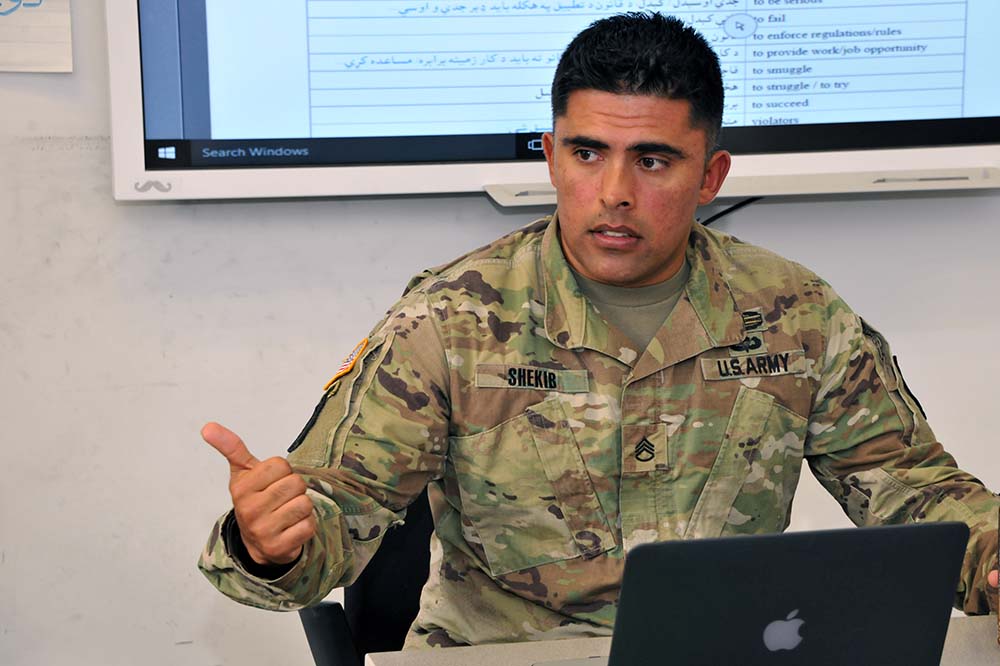
Staff Sgt. Mashal Shekib, a Military Language Instructor at the Defense Language Institute Foreign Language Center, Presidio of Monterey, California, teaches a Pashto class Nov. 3, 2017. Originally from Kabul, he immigrated to the U.S. in 2008 and enlisted in the U.S. Army in 2009. (U.S. Army photo by Patrick Bray/Released)
War began in 1978 followed by the Soviet invasion, the Afghan Civil War, years of infighting, the establishment of the Taliban Islamic Emirate, the NATO invasion and insurgencies that have lasted to this day.
But the worst of the worst times, according to Shekib, was during the 1996-2001 Taliban rule. Shekib grew up in a “very non-religious, very educated family,” he said, but both of his parents were without work during Taliban rule. His father was unemployed solely because he worked for the government prior to the Taliban. His mother could not continue her teaching job because she was a female – work was forbidden for women under the Taliban – and his sister could not go to school for that same reason.
Still, for Shekib and those who lived there, life went on as they tried to find normalcy. It was while in his senior year of high school that the world would change forever – Sept. 11, 2001.
“I remember watching the news showing the collapse of the World Trade Center, but I could tell the goal behind the newscast wasn’t to tell people how bad this was,” said Shekib. “Basically it blamed the Western world instead of sympathizing with the situation.”
Taliban state-sponsored news depicted the twin towers falling, followed by footage of scorched earth tactics and massacres by the Russian military during the Soviet-Afghan War. The scenes were designed to rally the Afghans against the potential war to come, but Shekib did not buy into this propaganda.
“My take was that they (Al-Qaeda) just killed innocent people,” said Shekib. “I knew, in the bottom of my heart, that wasn’t right.”
The U.S. overthrew the Taliban government in October 2001, launching Operation Enduring Freedom, though the Taliban insurgency continued to fight on.
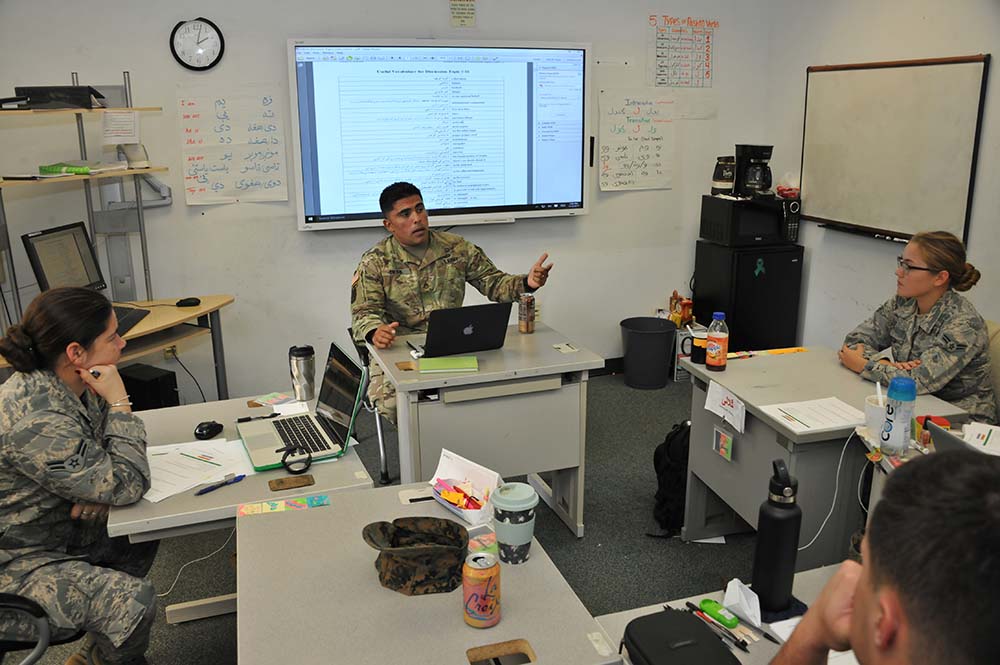
Staff Sgt. Mashal Shekib, a Military Language Instructor at the Defense Language Institute Foreign Language Center, Presidio of Monterey, California, teaches a Pashto class Nov. 3, 2017. Originally from Kabul, he immigrated to the U.S. in 2008 and enlisted in the U.S. Army in 2009. (U.S. Army photo by Patrick Bray/Released)
“I hate the word invasion. I never saw the U.S. as invaders. I saw them as liberators because they liberated me and my family,” said Shekib.
After high school, Shekib began working as an English teacher to Afghans and attending Kabul Polytechnic University. Soon, he was visited by military police at the school where he taught. Classrooms were divided by curtains in a building that was basically a large hallway.
“Three or four military police walked down that hallway, watching all of us,” said Shekib. “They waved at me and I waved back.”
The U.S. Soldiers approached Shekib. “Salaam alaikum,” they said in an attempt to talk to him and then asked, “If we were to tell you that we’re going to hire you right now as our interpreter would you leave this job and work for us?” For Shekib this was a dream come true. “I said yes and they said okay, let’s go now.”
“But hold on a second,” Shekib continued, as the MPs paused. “Let me get my bike.”
Telling Shekib not to worry, the Soldiers loaded his bike into a Humvee and it was waiting for him when he arrived at Camp Phoenix, the NATO military installation near the Kabul airport.
“I’d never leave my class like that today,” Shekib adds to reassure his DLIFLC students. “But the next day I did go back and formally resign.”
Eventually, both his parents got their jobs back, his sister went back to school and for Shekib, working for the U.S. Army couldn’t be more fulfilling. His first two years were with the MPs who hired him, which involved patrolling Camp Phoenix and training Afghan National Army Military Police.
“The senior NCOs in the company mentored the Afghan MP Company commander,” said Shekib. As the U.S. Soldiers taught and trained, Shekib translated.
His responsibilities grew and after two years Shekib transferred to the G2 section – military intelligence – where he translated for the intelligence officer and his counterparts in the Afghan National Army.
Shekib worked for the Army for five years all together until June 2008, when he received a visa under the Afghan Special Immigrant Visa Program, designed for those who were employed by the U.S. Government. More than 150 interpreters on Camp Phoenix at that time had applied, with others doing so as well across Afghanistan. The process took about three years for him due to vetting and the number of applicants.
A distant cousin of Shekib’s already lived in the U.S. and he helped Shekib to settle in Dumfries, Virginia. One of his first memories of arriving in the U.S. was at the airport where he noticed an abundance of electricity unlike anything he had seen before in Afghanistan.
“The lights, the brightness and the loudness of everything – the first question I asked my cousin was, ‘Do you all have this every day? Like 24 hours? What time do they shut it off?’” Shekib said, followed with a laugh. In Afghanistan, electricity was sporadic, only supplied for a few hours a day and definitely none at night.
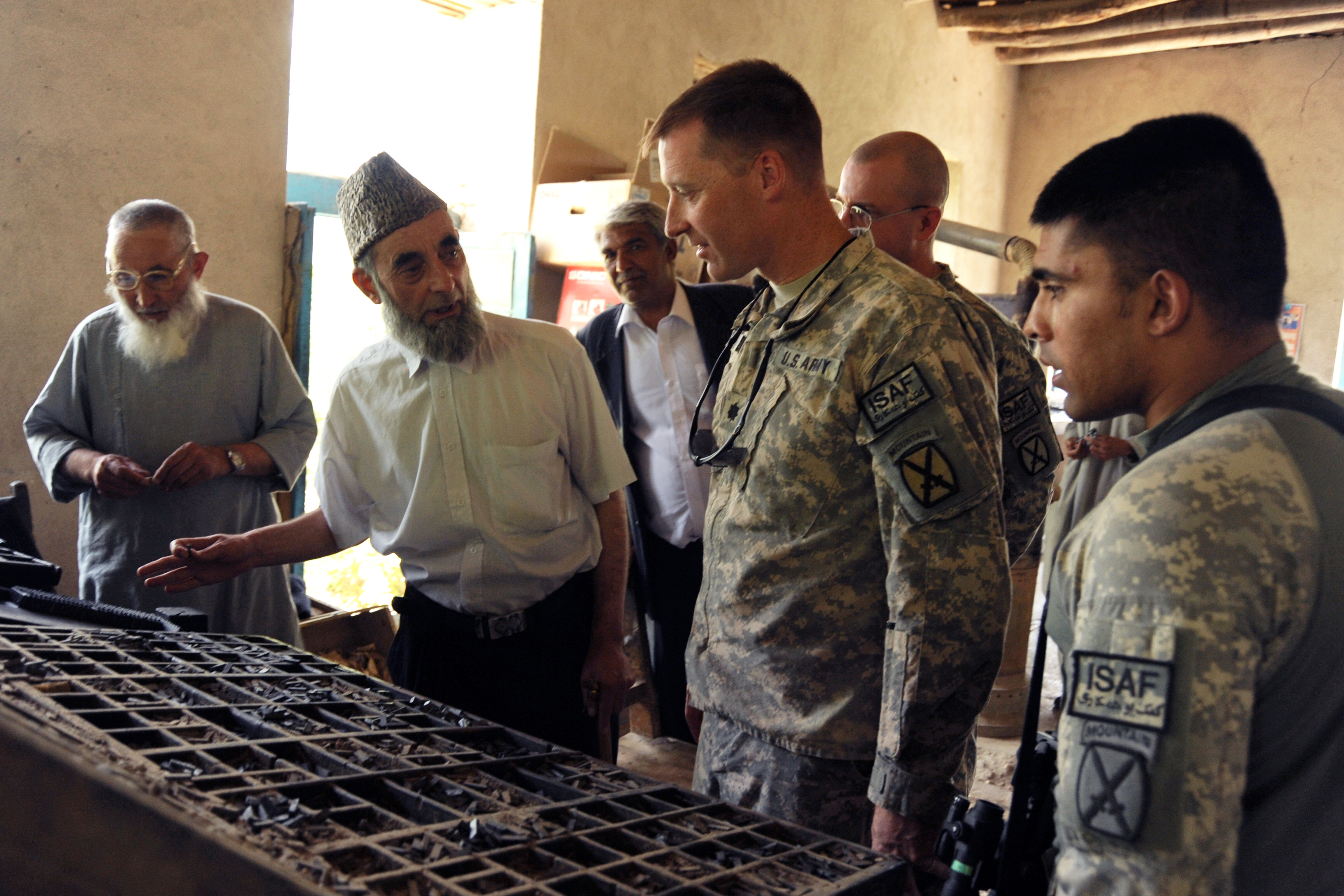
Staff Sgt. Mashal Shekib, known as “Marshall Sanchez” at the time, right, served as a linguist with the 10th Mountain Division in Afghanistan in 2010. Today he is a Military Language Instructor at the Defense Language Institute Foreign Language Center, Presidio of Monterey, California, teaching Pashto, from Afghanistan. Originally from Kabul, he immigrated to the U.S. in 2008 and enlisted in the U.S. Army in 2009. (U.S. Army photo by Sgt. Blair Neelands/Released)
After settling in the U.S. and a brief job teaching Pashto and Dari to Air Force defense attaches, Shekib enlisted in the U.S. Army. At that time, in 2009, Pashto and Dari linguists were in very high demand. His service also opened a pathway to him becoming a U.S. citizen.
As a Soldier, Shekib returned to Afghanistan in 2010, deploying as a military linguist with the 3-6 Field Artillery, 10th Mountain Division, from Fort Drum, New York. He interpreted on countless missions and his story was covered by the Fort Drum website, the Mountaineer Online, under the alias “Spc. Marshall Sanchez.” Today, Shekib feels he does not need an alias.
Upon return from Afghanistan, Shekib reenlisted. He bypassed DLIFLC twice – first when he enlisted as a linguist and then when he reenlisted into military intelligence.
“Switching from Dari to Pashto is still my native language, so I didn’t need to go to DLIFLC, when I reenlisted,” said Shekib. Then later at Fort Gordon, Georgia, in 2017, he received orders to the Institute.
“I was very surprised to learn that I would be coming here,” said Shekib, excited about the opportunity to be a teacher.
Today, Shekib says that teaching puts a smile on his face, especially when he hears students start to pronounce letters and sounds that don’t even exist in English, and then master it.

Staff Sgt. Mashal Shekib, a Military Language Instructor at the Defense Language Institute Foreign Language Center, Presidio of Monterey, California, teaches the Institute’s mascot, Pfc. Lingo, to sit, heel and stay Oct. 31, 2017. When he’s not teaching Pashto, from Afghanistan, Shekib likes to train dogs and operates his own canine training academy. Originally from Kabul, he immigrated to the U.S. in 2008 and enlisted in the U.S. Army in 2009. (U.S. Army photo by Patrick Bray/Released)
“The Army has done a lot for me and my family and I felt that I owe it back to them… that I should do something to pay it all back,” said Shekib, explaining why he serves.
When he’s not teaching, Shekib likes to train dogs and looks forward to an opportunity to train the DLIFLC mascot, Pfc. Lingo. Canine training is a skill he learned while working with the Fulton County, Georgia, Sheriff’s Department while stationed at Fort Gordon. Today, he owns and operates his own canine academy, MK9 Marshall’s Dog Training Service.
DLIFLC provides resident instruction in 17 languages at the Presidio of Monterey, California, with the capacity to instruct another 65 languages in Washington, D.C. The Institute has graduated more than 220,000 linguists since 1941.
In addition, multiple language training detachments exists at sites in the U.S., Europe, Hawaii and Korea, spanning all the U.S. geographic combatant commands in support of the total force.

